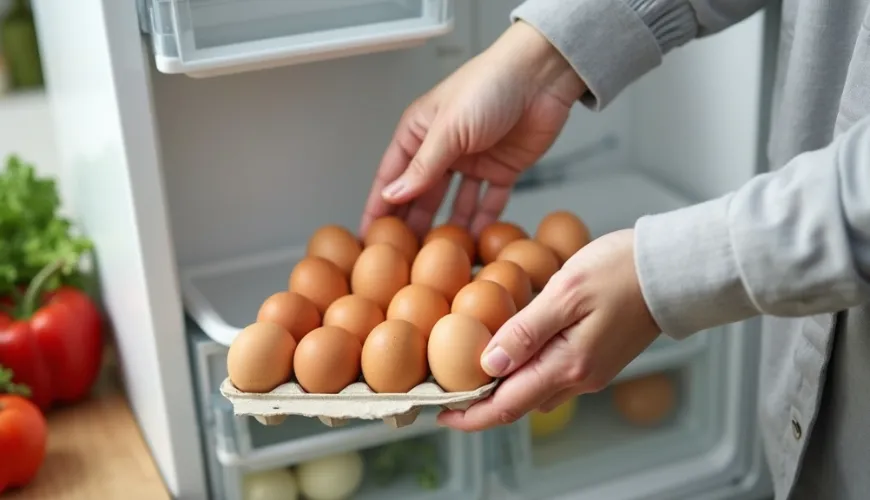
How to Store Boiled Eggs and Keep Them Tasty and Safe

How to Properly Store Eggs to Keep Them Fresh and Safe to Eat
Eggs are one of the staple foods that almost everyone has at home. They are nutritious, versatile, and can be prepared in dozens of different ways. Yet, mistakes are often made in their storage, which can shorten their shelf life or even pose a health risk. So how should eggs be stored properly to ensure they stay fresh and safe for as long as possible?
The topic of egg storage might seem trivial at first glance, but there's more to it than meets the eye. The difference between proper and improper storage can mean not just a loss of quality, but also the risk of bacterial contamination – for example, with salmonella. Therefore, it's worth taking a closer look at this everyday matter.
Why Does the Way We Store Eggs Matter?
While eggs are protected by their shell, it is not impenetrable. Through microscopic pores, air, moisture, and microorganisms can penetrate the egg. This is why it's important to pay attention to where and how we store eggs. Temperature, humidity, and contact with other foods all play a role.
Interestingly, in some countries – such as the United States – eggs are sold in refrigerated sections and must be stored in the fridge, while in Europe, you can commonly find them on unrefrigerated shelves. This is due to different processing methods. In the U.S., eggs are washed before sale, which disrupts the natural protective film. In Europe, this film is left intact, so the shell remains better protected.
However, wherever you buy eggs, proper storage at home is key. And not just for fresh eggs – there are also a number of rules for storing boiled eggs, which are often overlooked.
How Long Do Eggs Stay Fresh?
First, it's good to know how long eggs can be stored in the fridge. In the Czech Republic, the packaging must indicate the minimum shelf life, which is usually 28 days from the laying date. However, this doesn't mean that eggs must be discarded after this period – if stored properly and showing no signs of spoilage, they may be safe for a bit longer.
However, it's best to consume eggs as soon as possible, ideally within 2 to 3 weeks. Over time, they lose quality – the white becomes more liquid, the yolk can deform, and the egg can absorb foreign odors from its surroundings.
Proper placement in the fridge helps extend freshness. Although many fridges have a plastic egg holder in the door, it's not the ideal place – the temperature in the door fluctuates every time the fridge is opened. Eggs should be stored in the main part of the fridge, ideally at the back of one of the shelves, where the temperature is stable and cooler (ideally around 4°C).
Pointy Side Down – How to Store Eggs Correctly
Few people know that the way eggs are stored affects their shelf life. It's best to store eggs pointy side down. Why? In the wider part of the egg, there is an air bubble. If the egg is in this position, the air pocket remains at the top, and the yolk stays centered. This reduces the contact of the yolk with oxygen, maintaining better quality.
Additionally, it's good to keep eggs in their original carton. It protects them not only mechanically but also from absorbing odors from other foods. Eggs act somewhat like a sponge – they easily absorb the aroma of garlic, onions, or fish stored nearby.
Tip: You can note the purchase date on the carton to keep track of how long you've had the eggs at home.
How to Tell if an Egg is Still Good?
Want to find out if you still have fresh eggs at home? Just do a simple test: fill a glass with cold water and gently place the egg in it. If it sinks and lies flat at the bottom, it's fine. If it stands on its tip, it's a bit older but still usable. If it floats at the surface, it's time to say goodbye.
This test works because the air bubble inside the egg enlarges as the egg ages.
And What About Boiled Eggs?
You might wonder: how to store boiled eggs to keep them safe and tasty? Boiled eggs have a much shorter shelf life than raw ones. If they are unbroken and left in the shell after boiling, you can store them in the fridge for up to 7 days. However, if peeled, it's recommended to consume them within 2 days.
It's important to cool eggs as quickly as possible under cold water after boiling and store them in a cool place. Store peeled eggs in a closed container, ideally without contact with other foods.
A real-life example: A mom from Prague got into the habit of boiling eggs for her kids on Monday already on Sunday evening. However, she left them uncovered in the fridge without the shell. After two days, the kids complained that the "eggs smell like cheese." After changing her habits – keeping the eggs in the shell and in a closed container – the problem was solved.
The Myth About Washing Eggs
One of the common myths is whether it's appropriate to wash eggs before storing them in the fridge. The answer is no. The shell is naturally protected by a layer called the cuticle, which helps prevent microorganisms from entering. Washing disrupts this layer, making the egg more vulnerable.
If the shell is really dirty, you can wipe it with a dry or slightly damp paper towel just before use. But certainly not before storage.
Storing Eggs Outside the Fridge?
You might have heard that eggs were once stored outside the fridge. Indeed, fresh eggs can be kept at room temperature for a few days if they are not washed and not exposed to direct sunlight or temperature fluctuations. However, from a safety standpoint, it's better to store them in the cold – especially if you plan to consume them raw (e.g., in dressings or desserts).
According to the European Food Safety Authority (EFSA), the safest way to store eggs is to keep them cold immediately after purchase. This helps slow down bacterial growth and preserve product quality.
Summary of Basic Recommendations
- Store eggs in the fridge, ideally in the main part, not in the door.
- Do not wash them before storage – you would disrupt the protective film.
- Store them pointy side down and, if possible, in the original carton.
- Store boiled eggs for a maximum of 7 days, peeled best within 2 days.
- Do not use eggs that float in water – they may be spoiled.
As the famous American chef James Beard once said:
"A good egg is the foundation of every good kitchen." And it remains to be added that without proper storage, even the best egg won't stay good for long.
Paying a little attention to how we store eggs is definitely worth it. Not only will it extend their shelf life, but it also protects our health and the taste of prepared dishes. Eggs may be a common food, but it's often in the most ordinary things that the greatest room for improvement lies.

